| 摘要: |
| The paper addresses the problem of reconciling the modern control paradigm developed by R. Kalman in the sixties of the
past century, and the centenary error
based design of the proportional, integrative and derivative (PID) controllers. This is done
with the help of the error loop whose stability is proved to be necessary and sufficient for the close
loop plant stability. The
error loop is built by cascading the uncertain plant
to
model discrepancies (causal, parametric, initial state, neglected dynamics),
which are driven by the design model output and by arbitrary bounded signals, with the control unit transfer functions. The
embedded model control takes advantage of the error loop and its equations to design appropriate algorithms of the modern
control theory (state predictor, control law, reference generator), which guarantee the error loop stability and performance. A
simulated multivariate case study shows modeling and control design steps and the coherence of the predicted and simulated
performance. |
| 关键词: Modern control theory, error
based design, embedded model control, error loop, disturbance rejection |
| DOI: |
|
| 基金项目: |
|
| Embedded model control: reconciling modern control theory and error-based control design |
| Enrico CANUTO,Carlo NOVARA,Luigi COLANGELO |
| (Politecnico di Torino, Italy) |
| Abstract: |
| The paper addresses the problem of reconciling the modern control paradigm developed by R. Kalman in the sixties of the
past century, and the centenary error
based design of the proportional, integrative and derivative (PID) controllers. This is done
with the help of the error loop whose stability is proved to be necessary and sufficient for the close
loop plant stability. The
error loop is built by cascading the uncertain plant
to
model discrepancies (causal, parametric, initial state, neglected dynamics),
which are driven by the design model output and by arbitrary bounded signals, with the control unit transfer functions. The
embedded model control takes advantage of the error loop and its equations to design appropriate algorithms of the modern
control theory (state predictor, control law, reference generator), which guarantee the error loop stability and performance. A
simulated multivariate case study shows modeling and control design steps and the coherence of the predicted and simulated
performance. |
| Key words: Modern control theory, error
based design, embedded model control, error loop, disturbance rejection |

